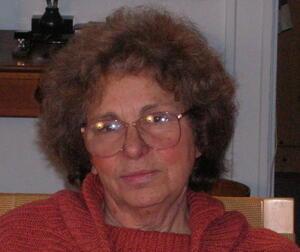Hilda Silverman
My first memories of Hilda date back to the late 1990s as she climbed the three flights of stairs in my home to join in the formative meetings of a political group that became Jewish Voice for Peace, Boston. Slightly breathless, she was usually in animated conversation with Ruchama Marton, an Israeli psychiatrist doing a fellowship at the Bunting Institute of Radcliffe College and Elaine Hagopian, Professor Emerita of Sociology from Simmons College and a scholar and activist on Middle East affairs. These three women can best be described as the political mothers and mentors for many of us in the Jewish peace movement.
Hilda quickly distinguished herself as an extremely knowledgeable, thoughtful, moral voice who was able to maintain a strong sense of her own Jewish identity and a painful awareness of the Holocaust while articulating a consistent and powerful critique of Israeli policy. In a 2002 op-ed published in the Philadelphia Inquirer, Hilda wrote, "I am a Jew with a profound consciousness of Jewish victimization through history. But for me, victim and victimizer, oppressor and oppressed are not mutually exclusive categories."
As a younger activist trying to find my way in the bewildering maze of history, politics, trauma, and conflicting narratives, Hilda's voice was a critical part of my education. In the book, Culture and Resistance, Edward Said told this story: "It was in 1988. There was a Tikkun conference in New York…I, and my friend Ibrahim Abu-Lughod were on a panel with Michael Walzer. At one point, in a moment of exasperation, Walzer said, 'All right, you're going to get your state, so I think it's important to stop thinking about the past. You go have your state, we'll have ours, and that's the end of it.' At which point, a woman in the audience, who I'll never forget – her name was Hilda Silverman – got up in a state of rage, railing at Walzer, saying, 'How dare you tell a Palestinian that he should stop reminding us of the past, when you and I belong to a people that is always reminding the world of how much we suffered, and asking people never to forget? How dare you tell a Palestinian to forget?'"
Whether Hilda was sharing her moral outrage, her prodigious memory of historical events, handing out leaflets, or vigiling with Women in Black, she was for me a courageous and passionate teacher and activist. It did not surprise me when I noticed that the letters on her ancient computer keyboard had rubbed off, dissolved by the sweat and the pounding of her frenetic, talkative fingers. When I was writing my own book, Broken Promises, Broken Dreams: Stories of Jewish and Palestinian Trauma and Resilience, I naturally turned to Hilda for guidance. Each chapter returned, scribbled with hieroglyphic comments, arrows, explanation points, or highlighted in bright red and yellow. She was unfailingly patient, smart, a stickler for details, but also generous in her praise. We debated the use of individual words: "terror attacks" versus "Palestinian suicide bombing." We struggled together over grammar, historical accuracy, intent. I wrote, "As we approach Jerusalem, our arrival is heralded by a massive traffic jam and the death defying drivers who combine utter chutzpah and a crazy, suicidal sense of entitlement," and Hilda queried, "is there a difference between chutzpah and a sense of entitlement?."
In the years before her tragically premature death at the age of 69, Hilda was honored by the Cambridge Peace Commission where she had helped organize the annual Holocaust commemoration. She was an outspoken supporter of efforts by the Armenian community in Watertown to get the Anti-Defamation League to acknowledge the Armenian genocide while launching the ADL "No Place for Hate campaign." She talked of joining a boat brigade to break the siege of Gaza and dreamed of appealing to Paul Newman to, "undo the damage of Exodus by talking about the Nakba." She explained that as he had contributed unwittingly to Nakba denial and the glorification of the founding of Israel, it was time for him to support efforts to tell the other side of the story. Besides, she added with her cheeky sense of humor, she had bought enough Newman's salad dressing over the years, that some of that Foundation was "my money!"
Hilda lived her incredibly energetic, accomplished, creative life as an exclamation point, often with a double underline and two stars. She died May 5, 2008 after a long and successful struggle with non-Hodgkin's lymphoma only to be taken by acute leukemia weeks later. She departed this life with grace and dignity, leaving detailed directions behind for her memorial and the distribution of her collection of art and stylish furnishings. It is left to us, her many friends, her son David, daughter Jen, and Jen's partner Retha Powers, to sort through her voluminous, quirky paper trail and to honor her inspiring example of a life well-lived.




It’s wonderful to read about Hilda here, she was 100% a force of nature and cannot be forgotten. I would say she possessed a quality of radical empathy, that would be a mild way to put it. Aside from the many years of work on Palestine, she also had some years as the leader of the ACLU in Philadelphia, and also worked on the rights of women prisoners. I know there is much more in her cv but I wanted to mention these things just to indicate that she was all-in on anything she put her mind to. We lost a lot when she passed on. Thank you.